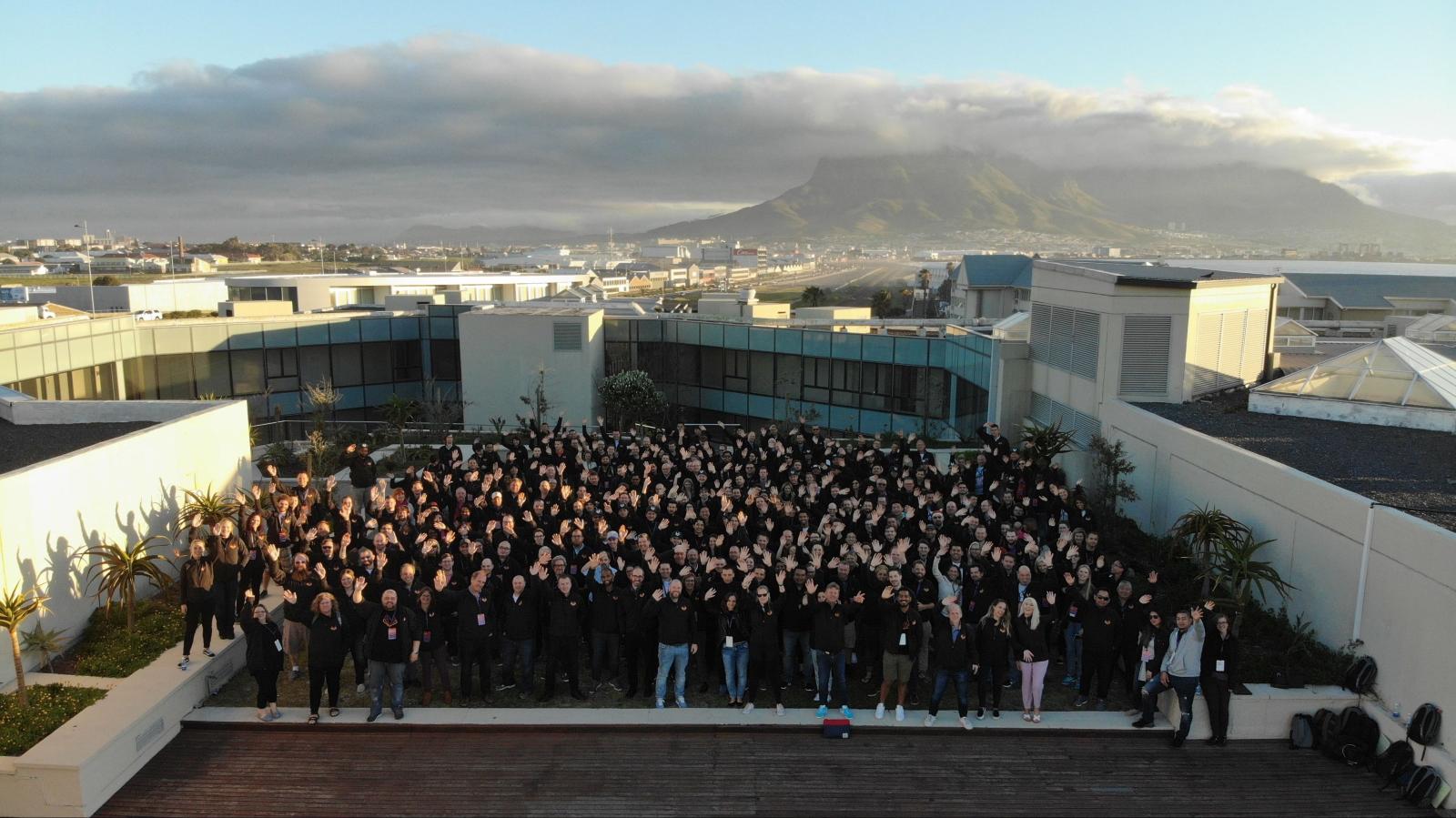Interview with Sid Sijbrandij, CEO and Co-Founder at GitLab

GitLab, the 44th company on Inc. 5000 list, is well-known for its award-winning product which is now serving over 37M users. Apart from that, GitLab is a unique company with a transparent corporate culture and a fully remote working environment. Built around open source philosophy, GitLab is sharing its stories of success on how to make the remote actually work with YouTeam CPO and Co-Founder, Yurij Riphyak.
Sid Sijbrandij, Ceo and Co-founder at GitLab, tells how to make 16 hires a week, scale a team to 500 people, and speed up meetings to 22 minutes, all while operating remotely.
Yurij: Let’s start with one thing. The companies who achieved massive success with distributed teams put a lot of effort into evangelizing this approach. GitLab has the famous remote manifesto, Zapier has its own huge guide on remote work, Jason Fried, CEO of Basecamp, published the book on remote work. Why do you feel is it important to promote this specific side of your company experience?
Sid: I think for many companies it’s inefficient to be co-located and have everyone in airplanes the whole time. Our handbook is a way to help companies scale by embracing remote. We created it because we needed more optimization. If you make a change and implement a new process, you should make it pain-free for the people who aren’t yet at the company. The only way to do it is through a handbook. So this book is meant as educational, not a promotional tool.
Yurij: Still nine out of ten founders I talked to expressed a strong preference toward keeping their entire team in-house. Why do you think other founders prefer being co-located?
Sid: It works really well if you are all in the same room. If you’re a team of seven people, the speed of iteration in a co-located setting can be very high. Based on that positive experience, people keep using the same model. They learn a lesson from the beginning that no longer applies to the company at scale.
As the company gets bigger, it’s harder to get benefits out of being co-located. It’s nice if you’re all in the same room, but it’s not so nice if you’re on the same floor, building or city. As you get bigger the benefits are reduced.
Yurij: What kind of advice would you give to the founders who at this very moment are like hesitating on which strategy to choose, start hiring in-house so that everyone is in the office or going remote?
Sid: You main jobs as a founder of a company are:
1 — to make sure there’s enough money and a clear growth strategy that everyone understands,
2 — to get the best people to work on it. It would be a big coincidence if they’re all located in where you are starting your company.
I don’t think it makes sense to try to limit your search for those people to just where you coincidentally tend to be. Meet the people where they are now and make it easy to join your company.
Yurij: Well, that makes sense. But how it all started? Do you remember that exact moment when the distributed team philosophy became intentional?
Sid: I’d say it happened gradually. As we grew from 150-200 to 500 people, we realized that there’s no limit to this growth and we’re really nice on remote. Maybe it changes one day, as remote is not one of our values, but we’ll do whatever works. It’s important to keep an open mind about things and to be willing to change your approach when you’ve faced new data.
Yurij: From the business’ building perspective, how do you justify this approach as compared to all others? Why do you think that remote culture is superior for GitLab?
Sid: It works better for us. Sometimes we make 16 hires a week now. If we work asynchronously, we have a lot of people onboarding. If you have all those people asking the same questions that is a big burden on your organization.

There are 150 new things employees have to ask, plus 2,000 pages in the handbook, of which about 200 pages are relevant. At GitLab, we address 95% of these questions up front. As a result, there’s a lot fewer questions left and people are more open to answering them.
Yurij: Okay this is interesting. What are the other things that didn’t go as expected when you embraced the remote early on?
Sid: I think it’s a continual struggle to write things down. The natural state of things is for people to say something in a structured format. Written communication is difficult because it takes constant reinforcing on the employer side and firm self-discipline on the employee side.
Yurij: What is your advice for remote teams to help them make virtual meetings more efficient?
Sid: Well, the first thing you should do is to make all company meetings optional.
The second thing you can do is to record the product demo up front. Record everything which doesn’t imply interaction in advance. This way, 22 minutes would be more than enough to have a productive meeting, a short Q&A session, and a discussion around shared materials.
The third you should do is to encourage people to work on other stuff. You can join a call, but it’s totally okay for you to do email. Just mute yourself so that people don’t have to listen to your keyboard. Don’t force people to do something that might not be of benefit.
Yurij: Did you realize that what you say is very counterintuitive to most managers?
Sid: I think it’s very counterintuitive to hire people and then dictate them how they should spend their time. If there’s value, they’ll do it. If there’s no value, they won’t do it. It’s up to them to produce the result.
Yurij:Based on hundreds of conversations with other founders, I tried to systematize the most common objections against having a remote team. What I ended up is a working title of ‘seven deadly sins remote’. Namely these are:
- IP theft of hoarding
- Communication gaps
- Time zone difference
- Lack of employee motivation and loyalty
- Weak culture link
- Distractions associated with working from home
- New employee onboarding challenges
I think we have addressed the last one already but it would be really cool if we can really briefly address each of those concerns. What do you think about IP theft or hoarding, for example?
Sid: Well, most companies nowadays allow people to travel with a laptop because they have to frequently travel and stay effective on the road. In terms of IP hoarding, I don’t see the difference between a co-located and a remote company.
Yurij: Okay, what about communications gaps?
Sid: I think communication is the hardest thing about running a company, but I don’t think it’s harder in a remote setting.
Yurij: What about time zone difference then?
Sid: Yeah, it’s a big problem, and there’s no perfect solution to it. Recording is a great way to time shift, so a lot of people consume it whenever it’s ready for them.

Time zone difference can be an advantage. We need support for customer questions, telecom, site-to-site reliability, etc. Instead of working at night shifts, people can work during normal hours, which I think is great.
Yurij: Lack of motivation and loyalty. Is it a problem for remote teams?
Sid: Well, when you are fully or partially remote, there’s no reason for loyalty to be different. I don’t like the word loyalty because you’re not always loyal. But I think people are free agents, so that they should and can do whatever is better for their productivity and themselves.
Yurij: How about culture? It’s the most frequent thing I hear from founders used as an objection to remote work.
Sid: I would say: make sure that you know exactly what you mean by culture. I’ve seen people use culture as an excuse to hire people that look similar to themselves and not have a very diverse team. Be mindful of that.
We see culture as sharing our values, and with your values you don’t enforce them all to be in the same office. What we do at GitLab four times a week is a breakout call with a group of people to talk about life outside of work. We have coffee breaks or coffee chats, we schedule 25 minutes with another person just to get to know them better.
We have a travel statement where you visit other team members and we’ll pay for that. There’s a couple of more examples, but we spend great time and effort making sure these things happen.
“The weather” or “which sports team is better” things are more important than personal things. That’s why having water-cooler conversations is important.
Yurij: Okay how about distractions when working from home?
Sid: Yeah, those are certainly present. I think they are the hardest on people who have kids. In GitLab our values we say “family and friends first, work second”, we try to lift that.
If people don’t want to work out from home but want to work from a co-working space or a rented office somewhere, we’ll pay for that. Everyone has to figure out how they incorporate the rest of their lives into their working days.
Yurij: Okay, so let’s talk a little bit about people, about the background picture of your team in particular. This is about 90% of GitLab team, right? Can you tell me a little bit about where the picture was taken?
Sid: Yeah, one of the things we do to form social bonds is we have our contribute event every 9 months and we fly everyone to a location.

This picture was taken in Cape Town, South Africa. I think we were 300 people at the time, but now we’re 500 people.
At corporate events, we don’t lock people into a conference room and make them watch presentations. There is an opening and a closing event. Most of the time we spend on excursions, going out and exploring the site where we’re at. People in the company propose a subject they want to talk about. You can join whatever you like to join. It’s been a great way to get people for this kind of informal connections.
Yurij: So I believe people in this photo are not just developers, there are salespeople, customer support, HR, marketing and so on and so forth. How easy it is for a person to transition to a remote workspace? Are there any types of jobs that fit better for a remote setup and types of jobs that don’t fit that good?
Sid: Yeah, I do think that we all struggle with different things here.
Our salespeople are still very used to direct messaging people instead of working at a public channel. It’s a hard habit to break and I can see how hard is that.
Our marketing people took a while to embrace remote but now they do all the work at GitLab remotely. That’s why I don’t think that there’s any department that cannot do remote.
Yurij: When you interview a candidate, how do you know that this person is going to be the right fit for GitLab? Can you share some interview questions or specific tricks for that?
Sid: We do ask people if they’re open to remote work, but there’s nothing that predicts success by just remote itself. What does predict success is making sure that you can allocate your own time and set your own priorities properly.
If you depend on your manager to look on your screen every now and then to make sure you’re not on Facebook, you’re not gonna have a good time with GitLab.
Yurij: Let’s say we have borrowed a Time Machine and traveled into the future. 20 years from now, the year is 2039, and the remote work paradigm has taken over the world. What are the things that are most strikingly different from now (businesses, human behavior, political, cultural things, etc.)?
Sid: I think one of the striking things will not be the remote becoming a new default, but the co-located companies having a super hard time changing their model. For co-located companies, it’s almost like going extinct and being replaced by new companies that are all remote.
Apart from that, what I think will also happen in the future is:
- We’ll see a full operation of ‘hey these days I’m going to spend with my family together’.
- Not having a proper internet and a webcam will be equal to coming to work in a dirty shirt.
- Income will be better distributed, no matter the location: be it New York, London, Berlin or a tiny metro area.
Yurij: Well let’s live, wait and see! I also share this opinion that remote work is kind of a different way to build the workplace. It can have a much more profound impact on the economy and society than we can see now. It’s really cool that you are pioneering this.
Sid: Companies like GitLab are living proof that you can build a super successful world without sitting in one nice glass shiny office with your logo on the top.
This interview is just a tiny part of our huge project – a series of founder stories shared by YouTeam. Enjoy your reading and keep coming back for more opinions from the world’s most successful tech founders!





